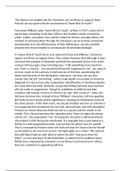Essay
"Sweet Bird of Youth" Tennessee Williams - Essay on Character's Flimsiness
- Course
- Institution
- Book
This essay is graded A* (96%, 24/25) AS Level providing an interesting and different analysis of the play, relating characters to themes and weaves critical analysis and close reading into the essay and links different parts of the play together. Rich in quotes on reality, youth, love from multiple...
[Show more]




